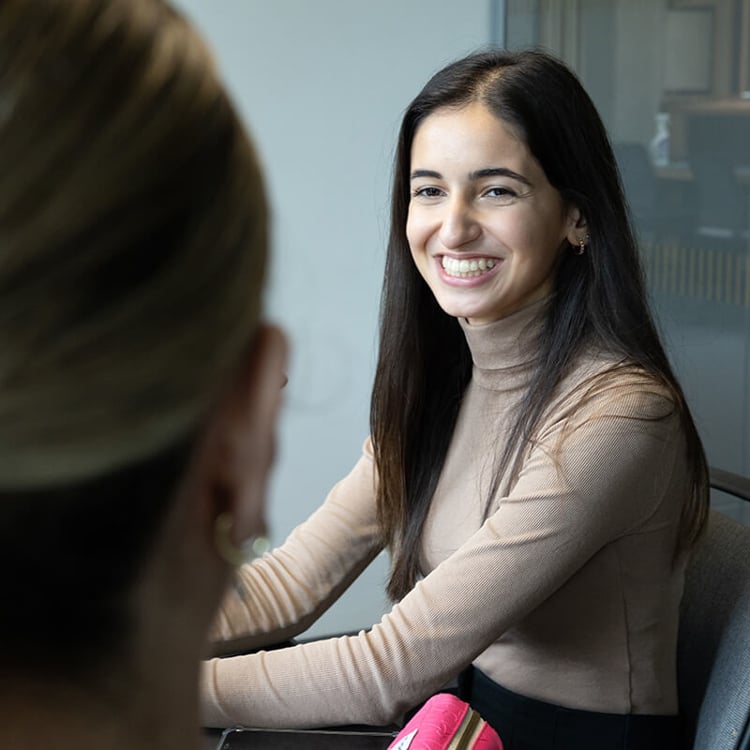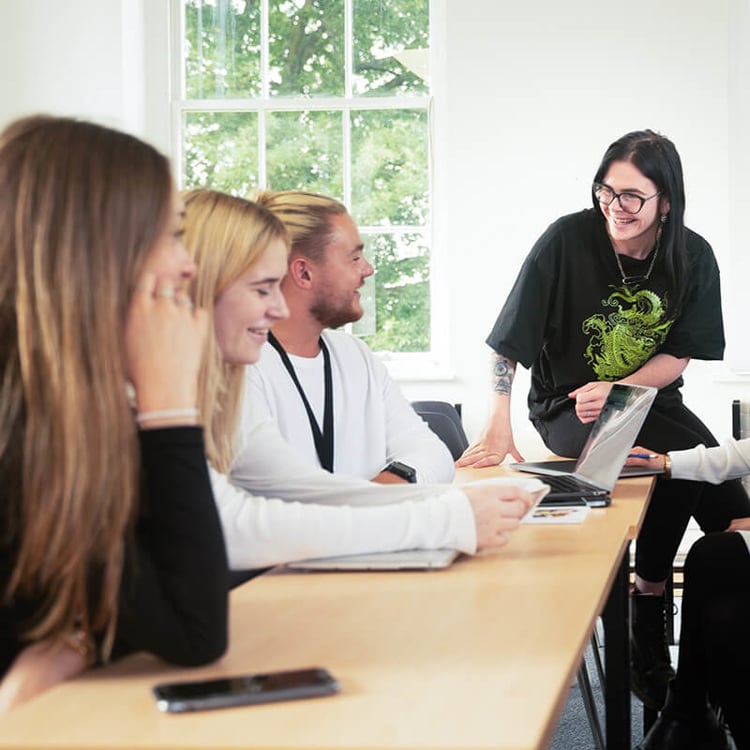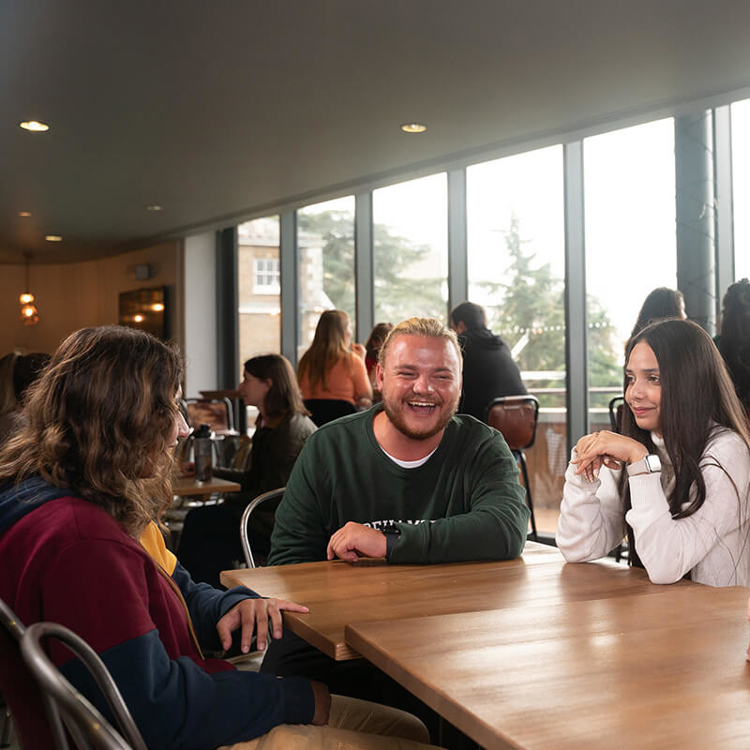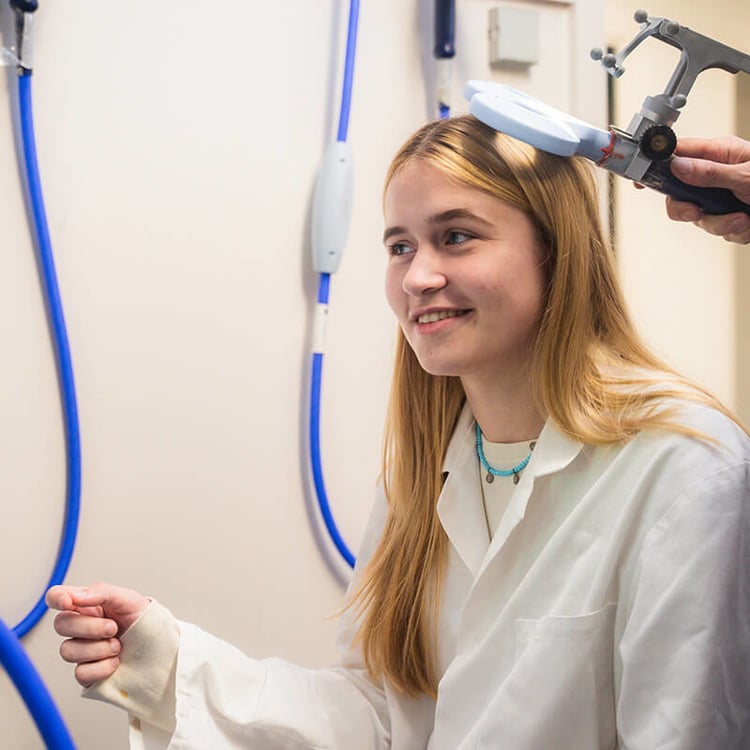You'll need:
2025/26 entry: Call 0300 303 8320 to find out if you are eligible for this programme in Clearing
UCAS Codes:
C8X1
C8X9 (if choosing Foundation Year)
Start date(s):
September 2025
September 2026
Clearing
CLEARING 2025
Be Roehampton
Open for Clearing
Call us on 0300 303 8320Complete our Clearing self-application
A career focused psychology degree, ideal if you want to work in education. With hands-on placements in a range of settings, alongside core psychology modules, you’ll study a degree that will set the foundation for your future.
Did you know?
You’ll learn across a mixture of lectures and small group seminars.
At least 50% of your teaching will be in seminars, lab classes or workshops, giving you tailored teaching and contact time with your lecturers.
Top modern university in London in Education
(Complete University Guide 2025)

Silver in the 2023 Teaching Excellence Framework (TEF)
For delivering high quality teaching, learning and outcomes for our students.
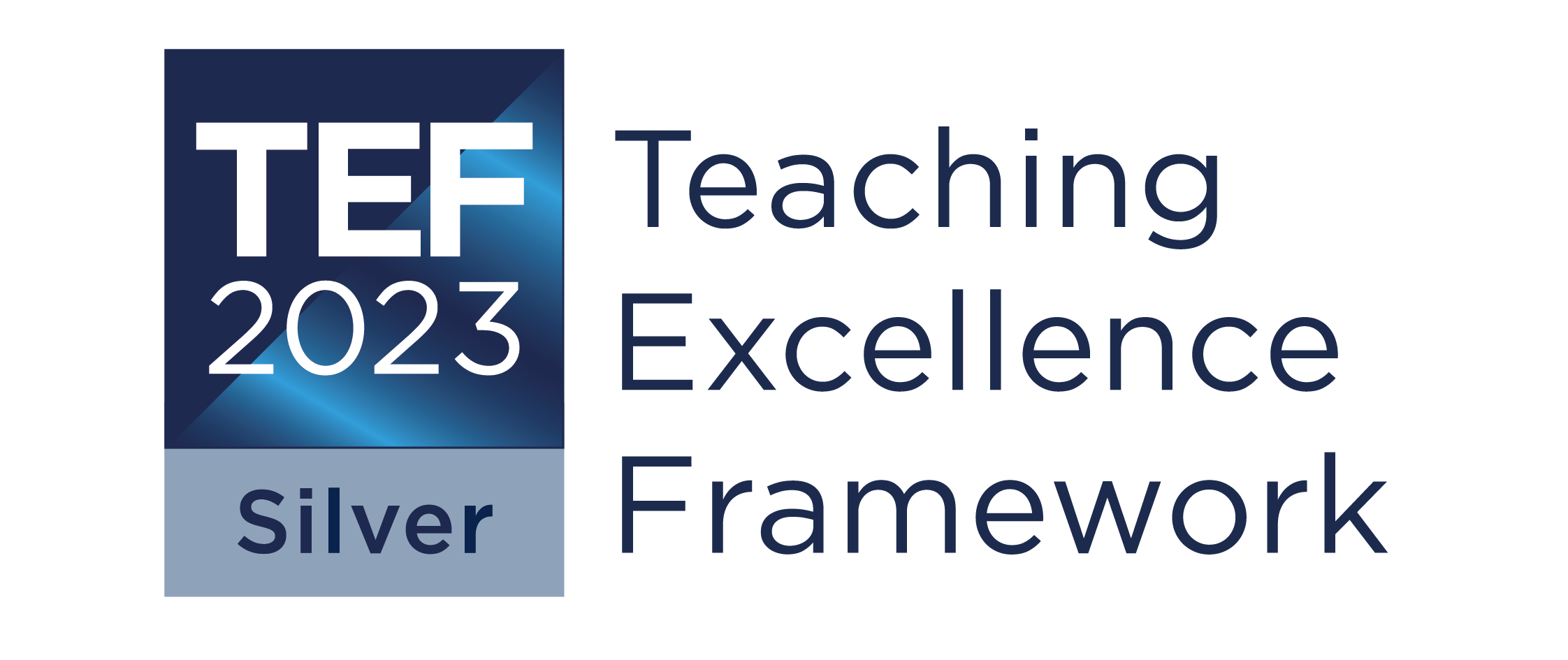
#8 in England for undergraduate student satisfaction
National Student Survey 2024

Modules
Modules Details: This module provides an opportunity to maximise your success within and beyond your degree. Through interactive lectures and seminars, you will explore topics that prepare you for university, postgraduate study, and the workplace. Sessions address procrastination, time management, and anxiety, helping you reach your full potential. You will develop research and reporting skills essential for psychology and related fields. The module also explores artificial intelligence (AI), emphasising its role alongside human intelligence. Additionally, you will identify and develop key skills, gaining insight into future career opportunities and professional growth, empowering you to excel in your chosen path.
How you’ll learn: You will be taught through a mixture of lectures and seminars. Lectures will cover key information and concepts to support your personal development. The seminars offer hands-on opportunities to apply lecture concepts in practice. You'll work independently and with peers to develop skills such as resource finding, debating, analysing, and presenting. You will also learn to use AI critically, ethically, and creatively—for example, for feedback, discussing complex ideas, and interview practice. This will help deepen your understanding while identifying AI’s limitations. Seminar activities will also support your assessments, enhancing your ability to engage with AI effectively and refine your academic skills.
Assessment: The assessments provide engaging ways to showcase your skills and understanding. You will be evaluated through a presentation, a critical debate, and a reflection. These tasks will enhance your ability to communicate clearly, present information effectively, and write persuasively. You will also develop skills in using AI for critical debate and reflection. These assessments will strengthen key abilities essential for your degree, postgraduate studies, and many workplaces, preparing you for future academic and professional success.
Module details: In this module, you will explore the foundations of psychology, gaining essential knowledge for your degree. You will study historical perspectives and key areas, including cognitive psychology, which examines mental processes; biological psychology, which links biology and behaviour; developmental psychology, which explores human growth; and social psychology, which investigates social influences. You will also consider individual differences. By integrating these perspectives, you will develop a well-rounded understanding of psychology and essential research methods, preparing you for further study and careers in related fields.
How you'll learn: You will be taught through lectures and seminars. Lectures provide an overview of each topic, highlighting psychology's contributions and applications. Seminars, linked to lectures, offer interactive engagement through discussions, debates, and quizzes. Activities may include applying concepts to real-world issues and research practical's illustrating psychological methods and data interpretation. Each seminar is tailored to its topic while supporting assessments. This approach ensures a dynamic learning experience, deepening your understanding of psychology in practical contexts.
Assessment: Assessment for this module includes a poster and a portfolio, helping you develop research, presentation, and written communication skills. You will enhance your ability to summarise information, evaluate material, and think analytically. These skills are essential for your degree, postgraduate studies, and are highly valued by employers.
Module details: This module introduces research approaches and data analysis methods used in psychology and related fields. You will learn to develop research questions and analyse data using both quantitative and qualitative methods. Quantitative analysis includes statistical techniques to describe data and explore relationships, while qualitative methods focus on identifying themes in text or interviews. This knowledge is essential for your degree, particularly for further data analysis and your final-year research project, as well as for postgraduate study and workplace applications.
How you'll learn: This module combines lectures and workshops to develop your understanding of research approaches and data analysis. Lectures will introduce key concepts and theories, while workshops provide hands-on experience in developing research questions, designing studies, and analysing data. You will also learn to use various software packages for data analysis. These interactive workshops will reinforce lecture content and support your assessments, ensuring you gain practical skills essential for conducting research throughout your degree and in future academic or professional settings.
Assessment: In this module, you will be assessed through a poster on a specific research question and a portfolio including tasks such as a literature review and research write-ups. These assessments will develop your research, data analysis, written communication, and presentation design skills, which are essential for your degree, postgraduate studies, and are highly valued by employers, enhancing your employability.
Module details: This module explores the intersection of psychology and education, introducing key theories, values, and concepts relevant to both fields. It focuses on the application of psychological knowledge in real-world educational settings. Through the examination of topical issues and contrasting perspectives, you will engage in critical debate and develop reflective skills. These skills will be valuable as you progress in your studies, fostering a deeper understanding of psychology in education and its practical implications.
How you’ll learn: You will learn through a combination of weekly lectures and seminars, exploring influential psychological theories related to human learning and development. Lectures will address key debates in education, such as the impact of technology on learning and fostering inclusive educational settings. In seminars, you will engage in practical activities to develop critical evaluation skills, analysing theories and research while considering their practical implications. Dedicated seminars will offer assessment support and formative feedback, while weekly online resources will help consolidate your learning and digital skills.
Assessment: Your assessments for this module will include a poster and a case study, designed to showcase your presentation, communication, academic writing, and problem-solving skills. In seminars, you will develop your ability to collaborate, present, and apply knowledge to real-world case studies. These activities will also encourage reflection on your personal development. The skills you develop through these assessments will be valuable as you progress to the next level of your studies.
These are the current planned modules on this course and may be subject to change.
Module details: This module will develop your knowledge of key areas in psychology, including social psychology, developmental psychology, and individual differences. You will explore how social influences shape thoughts and behaviours, how cognitive, social, and emotional development occurs across the lifespan, and how individuals differ in these processes. By evaluating different explanations for human behaviour, you will consider real-life applications, such as the impact of social media, peer influences, neurodiversity, and identity formation. This knowledge is essential for further study on social and developmental psychology and is valuable for careers in education, healthcare, social care, and community settings.
How you'll learn: This module is delivered through lectures and seminars, covering conceptual, theoretical, cultural, and historical perspectives on behaviour, identity, and individual differences. Lectures will link content to current affairs, while seminars will include interactive activities such as quizzes, discussions, and practical research exercises. You will explore real-world applications, such as identity formation and intelligence testing, while developing teamwork and self-reflection skills. These transferable skills will benefit various career paths, and seminar activities will also support you in preparing for assessments.
Assessment: You will be assessed through a poster and a portfolio, which will enhance your skills in presentation design, communication, and the ability to summarise, synthesise, evaluate, and apply psychological knowledge. These skills are essential for further study and postgraduate education, as well as highly valued by employers, supporting your future career development.
Module details:In this module, you will undertake a placement in an educational setting, allowing you to apply subject knowledge and practical skills while developing key competencies in line with QAA benchmarks. Through supported preparation, hands-on experience, and reflective practice, you will consolidate academic learning in real-world contexts. You will explore themes such as equity, diversity, and inclusion, and engage with pressing educational challenges. With flexibility in choosing your placement, personalised support, and access to enrichment opportunities, this 30-credit module spans two semesters and is designed to build your confidence, broaden your experience, and enhance your future career prospects.
How you'll learn: Lectures will explore key areas of educational enquiry and practice, including theory, research, and essential training such as DBS, Safeguarding, and the Chancellor’s Award. Seminars will focus on critical thinking and reflective workshops, supported by 30 minutes of weekly asynchronous digital learning, including ePortfolio tasks, discussion forums, guest speaker content, and a range of multimedia resources.
Assessment: This module is assessed through an online ePortfolio, used both as a learning and assessment tool to develop reflective practice. Students will critically engage with theory and apply it to real-world observations from their placement, while also reflecting on personal and professional development. The ePortfolio supports the integration of academic and practical learning, encourages ownership of progress, and helps build skills for future career pathways. Structured tabs will guide students through reflective tasks, enabling them to evaluate their strengths and areas for growth.
Module details: In this module, you will explore the fundamental processes underlying human cognition and the relationship between physiological functions and mental processes. Key topics include learning, perception, attention, memory, and language, alongside the neurobiological basis of psychological experiences. Using current neuroscience research, you will develop an understanding of how biological factors influence cognition. Through theoretical study and empirical research, you will gain essential knowledge for further study, postgraduate education, and careers in psychology, neuroscience, and related fields, enhancing your academic and professional development.
How you'll learn: In this module, lectures and seminars will explore conceptual, historical, and contemporary ideas in cognitive and biological psychology. Lectures will cover key concepts and theories relating to topics in cognition and neuroscience. Seminars will include practical activities to apply theories from lectures and provide support for assessments, encouraging critical engagement with the material.
Assessment: In this module, you will be assessed through a presentation and a portfolio, enabling you to further develop skills in effective communication, critical handling of materials, and scientific reasoning to explore alternative approaches and solutions—key competencies for your future studies and employment.
Module details: In this module, you will expand your understanding of research approaches and data analysis methods in pPsychology and related fields. You will develop skills in advanced quantitative and qualitative analysis, including ANOVAs, regression, psychometrics, and qualitative methods like interpretative phenomenological analysis (IPA) and discourse analysis. This knowledge will be essential for your degree, particularly your independent research project in Year 3. More broadly, mastering research methods will enhance your ability to evaluate evidence throughout your studies. These skills are also highly valuable for postgraduate study and a wide range of careers that require data analysis and critical thinking.
How you'll learn: This module will be delivered through a combination of lectures and workshops, with lectures covering key concepts and theories in data analysis. In workshops, you will apply this knowledge by developing and conducting research studies, analysing data, and engaging in activities that support your assessments.
Assessment: You will be assessed through a qualitative and a quantitative research report, where you will describe the study's background and methods, analyse a dataset, and interpret the findings in the context of existing research. These assessments will enhance your research, data analysis, and written communication skills, which are essential for your degree, postgraduate studies, and a wide range of careers.
These are the current planned modules on this course and may be subject to change.
This course offers all students the option of a one-year paid work placement, to boost your employability even further. If you choose this route, you will take the placement following year two of your course, and then return to complete your degree.
Why take a placement?
A placement year is the perfect opportunity to gain valuable work experience, to build on the career skills we will teach you on this degree. The connections you make on the placement will improve your career prospects further, and equip you with the skills you need to secure graduate-level employment.
How we support you
The University's Placement and Work Experience Team are experts at helping you to secure a placement. They will work closely with you from the start, helping you research potential employers, discover placement opportunities, create and pitch your CV, and will coach you to perform well in interviews. We aren't able to guarantee a placement, but our sector-leading advisors will give you the best possible chance of securing one.
Find out more about how we'll support you
We understand that your plans might change once you start your programme. If you decide not to do a placement, you will have the option of completing the three year version of your programme.
Whatever your choice, you will have access to many opportunities for work experience through our Placement and Work Experience Team, and access to face-to-face and 24/7 online careers support.
Module details: In this module, you will apply your knowledge of psychological research methods and data analysis to design, conduct, and report on an independent research project. You will formulate research questions, collect and analyse data, and interpret your findings in the context of existing literature, considering their implications. The available projects will cover various areas of psychology, allowing you to choose a topic of personal interest. The skills gained in planning, executing, and reviewing research are valuable for postgraduate studies and many careers.
How you'll learn: You will be supported by a supervisor with expertise in your chosen topic area, meeting regularly, typically in small groups. In addition to these meetings, lectures and workshops will help develop your research skills and support your work for the module, with lectures covering report-writing and data analysis methods, and workshops offering opportunities to apply these concepts to your own project. These sessions will provide valuable support for your assessments throughout the year.
Assessment: Whichever project you choose, you will need to write a project report and deliver a poster presentation, helping to develop your written and oral communication skills. Throughout the module, your work will also enhance your research and project management abilities, equipping you with a range of transferable skills that are valuable for postgraduate studies and various graduate careers.
Module details: This module aims to develop your understanding of applying psychology to education. You will explore the psychology of learning and teaching, critically examining how psychological theories inform policy and practice across various educational settings. The module will deepen your understanding of child learning, teaching methods, and educational strategies in real-world contexts. It provides a valuable pathway for those interested in careers in educational psychology, teaching, special educational needs, or mental health in education, offering insights into diverse educational challenges.
How you'll learn: Through a combination of weekly lectures and seminars, you will explore contemporary learning contexts, including psychological approaches to educational transitions, the impact of technology on learning and wellbeing, and systemic barriers to optimal learning outcomes. Lectures will cover core concepts and key issues, while seminars will allow you to engage in critical debate and develop transferable skills such as communication and teamwork through practice-based activities. You will also receive feedback and support in designated seminars to help prepare for your assessments.
Assessment: Your assessments for this module will include a presentation and an intervention proposal, designed to showcase your critical evaluation and problem-solving skills in addressing real-world issues in education settings. These assessments will also assess your written and oral communication abilities. Developing these competencies will enhance your employability and provide valuable skills for postgraduate studies and various professional environments.
Module details: In this module you will explore the vital role of wellbeing in learning and development. Through a holistic lens, you will examine the physical, emotional, social and mental dimensions of wellbeing, drawing on theories, policy, and practical strategies. You’ll engage with approaches such as positive psychology, social pedagogy and SEL, while reflecting on your own growth. The module includes case studies, peer collaboration, and opportunities such as Mental Health First Aid certification to support inclusive, resilient and supportive educational environments.
How you'll learn: Lectures will provide core content, including key concepts, theories and empirical evidence, as well as context for each topic. Seminars will involve small group work, discussion and practical activities, supported by 30 minutes of weekly asynchronous digital learning through quizzes, forums, expert talks and videos with related tasks to deepen understanding.
Assessment: This module will be assessed through a blog or journal entry and a written report. The blog or journal will focus on practice and personal development, while the report will explore the theoretical aspects covered throughout the module.
Module details: In this module, you will explore neurodevelopmental conditions, with a focus on autism. Adopting a multidisciplinary approach, you will learn about how autistic individuals process and understand information, as well as assessments and, therapies for autism, and factors influencing the development of autism development. You will also examine other neurodevelopmental conditions, comparing similarities and differences between these. The module will cover current perspectives, future research directions, and societal views on neurodiversity. Emphasis will be placed on applying theoretical knowledge to support individuals, making this module particularly relevant for future careers in related fields.
How you'll learn: You will learn through a combination of lectures and seminars. Lectures will cover key theories and research on autism and other neurodevelopmental conditions. In seminars, you will engage in activities to explore how to apply this knowledge in supporting individuals, including assessments and therapies for these conditions. The seminars will also provide guidance and support for your module assessments.
Assessment: You will be assessed through a leaflet and a stakeholder report. The leaflet will help you develop skills in communicating with non-academic audiences and applying knowledge of neurodevelopmental conditions to support individuals. The stakeholder report will enhance your written communication, critical evaluation, and ability to synthesise and summarise information on autism and other neurodevelopmental conditions. These assessments will help you develop key transferable skills, which are valuable for postgraduate studies and a range of graduate career opportunities.
These are the current planned modules on this course and may be subject to change.
This course offers a foundation year, which takes place at the beginning of your studies. Studying a foundation year will give you academic and practical experience, and a strong introduction to your subject, ensuring you succeed on your undergraduate degree.
30 credits
You will develop your core academic and integrated English language skills of speaking, listening, reading and writing. You will become familiar with key academic skills and concepts, such as referencing methods and awareness of academic integrity and tone. You will apply these skills and knowledge to both broad topics and also your chosen subject pathway.
Teaching and learning
You will be required to actively engage in on-campus learning for up to 10 hours a week.
You will be taught through a full range of teaching and learning methods, which include lectures, seminars, workshops, discussion groups, group directed tasks and presentations. This will enable you to learn from your peers and tutors in both structured and information settings.
You will be encouraged to think creatively about your approach to learning and discussions with your peers. You will also have access to recordings, resources, links and signposting through Moodle to enrich your learning.
Assessment
You will be assessed through group and individual presentations, comparative and reflective essays, multiple choice exams, coursework and reports, oral exams, portfolios, case studies and blogs.
30 credits
You will develop your core academic and integrated English language skills of speaking, listening, reading and writing. You will become familiar with key academic skills and concepts, such as referencing methods and awareness of academic integrity and tone. You will apply these skills and knowledge to both broad topics and also your chosen subject pathway.
Teaching and Learning
You will be required to actively engage in on-campus learning for up to 10 hours a week.
You will be taught through a full range of teaching and learning methods, which include lectures, seminars, workshops, discussion groups, group directed tasks and presentations. This will enable you to learn from your peers and tutors in both structured and information settings.
You will be encouraged to think creatively about your approach to learning and discussions with your peers. You will also have access to recordings, resources, links and signposting through Moodle to enrich your learning.
Assessment
You will be assessed through group and individual presentations, comparative and reflective essays, multiple choice exams, coursework and reports, oral exams, portfolios, case studies and blogs.
30 credits
You will develop your research, numeracy and information technology skills. You will investigate the difference between primary and secondary research, conduct your own research project and demonstrate your findings through data analysis. You will also develop your awareness of equality, diversion and inclusion in the UK, through a real-world issue; discrimination in the workplace.
Teaching and learning
You will be required to actively engage in on-campus learning for up to 10 hours a week.
You will be taught through a full range of teaching and learning methods, which include lectures, seminars, workshops, discussion groups, group directed tasks and presentations. This will enable you to learn from your peers and tutors in both structured and information settings.
You will be encouraged to think creatively about your approach to learning and discussions with your peers. You will also have access to recordings, resources, links and signposting through Moodle to enrich your learning.
Assessment
You will be assessed through group and individual presentations, comparative and reflective essays, multiple choice exams, coursework and reports, oral exams, portfolios, case studies and blogs.
30 credits
This module focuses on an in-depth exploration of applied psychology, drawing on foundational theories and models that explain human behaviour. You will engage with the issues and debates around some of the core psychological concepts, such as prejudice, stereotyping, group dynamics, and conformity, gaining a broad understanding of what influences human behaviours.
The module introduces the bio-psycho-social model within health psychology, providing a holistic framework for understanding health-related behaviours. You will gain a knowledge of how different psychological theories and models can be applied to understand the development of risky health behaviours and can be applied to design effective health intervention strategies.
You will learn the skill of collaborative group work, which is an integral part of the module, encouraging you to apply your knowledge of psychological theories to analyse and present a case study on risky health behaviour. You will also develop the skill of critical analysis, integrating various theories and models in psychology to explain risky health behaviour and suggest intervention programs.
Teaching and learning
The teaching delivery for each module consists of one, one-three-hour lecture and one, two-hour seminar per week. You will learn through a blend of lectures and interactive sessions, case studies and group presentations.
There will be an additional 30 minutes of online support per week. This will consist of individual tasks such as quizzes, posting on discussion forums, watching videos and taking notes, and reading articles or chapters.
Assessment
This module will be assessed using a written assessment and a group presentation.
50% - written assessment, composed of two parts; essay and self-reflection. You will write an essay on your knowledge of at least two psychological theories or models to explain why people develop risky health behaviours and propose and evaluate intervention strategies. You will reflect on your experience and learning journey as you prepared for and wrote the essay.
50% - group presentation, where you will apply knowledge from psychology theories to plan health interventions on risky health behaviour.
30 credits
This module focuses on the different perspectives available in psychology to explain human behaviour.
You will get the opportunity to explore methods of scientific thinking and reasoning within a Psychology context in an enquiry-based way. Problem-based learning and blended learning (combines online and face-to-face time) approaches will facilitate deep, experiential learning.
You will gain knowledge on what scientific thinking is, how to distinguish this from pseudoscience and how the scientific cycle enquiry can be applied to the various perspectives in psychology.
You will be encouraged to explore how different perspective in psychology can explain human behaviour, scientific argumentation and ethical working practices in relation to current scientific topics as reflected in news reports, recent academic publications and historical case studies. You’ll gain the skill of critical thinking and how to apply concepts from psychology to explain everyday behaviour, as well as poster presentation and public speaking.
Teaching and learning
The teaching delivery for each module consists of one, one-three-hour lecture and one, two-hour seminar per week. Lectures will introduce the scientific basis of knowledge and research methodologies in the context of Psychology and empower you to distinguish between science and pseudoscience, while seminars will consist of individual and group activities on the weekly topics.
There will be an additional 30 minutes of online support per week. This will consist of individual tasks such as quizzes, posting on discussion forums, watching videos and taking notes, and reading articles or chapters.
Assessment
This module will be assessed using a group poster presentation and written assessment.
40% - group poster presentation, you will compare and contrast any two perspectives on psychology.
60% - written assessment, you will write a critical essay on how pseudoscience differs from science.
These are the current planned modules on this course and may be subject to change.
Foundation Year
This course can also be studied with a foundation year (September entry only).
Our suite of Psychology programmes has a strong history of accreditation and has consistently been commended for our high-quality education and outstanding student experience by the British Psychological Society (BPS).
Following a recent review and enhancement, this programme has been carefully redesigned to continue meeting all BPS accreditation standards and is currently pending reaccreditation by the BPS in early summer 2025.
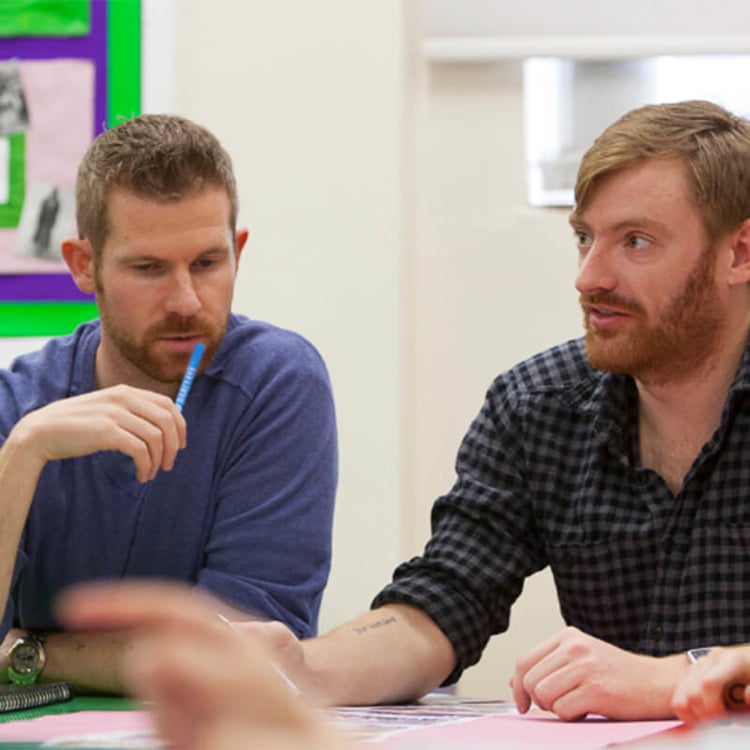
Skills
Inspired by the fact that around 30% of our psychology graduates go on to work in education, this degree combines both disciplines giving you the foundation for your future career.
You'll graduate with skills in:
- Applying psychological principles to educational practices, to benefit the way we teach and support children.
- Enhanced communication and interpersonal skills, so you can work with students, educators, and stakeholders.
- Strong research and data analytics skills for evidence-based decision-making in education settings.
You'll graduate prepared to excel in a range of careers, including education, research, policy, and psychology-related fields.
You'll study in a supportive and inspiring environment. You’ll learn core and contemporary subjects within psychology and explore inclusive and holistic approaches to teaching and learning.
In your final year the two disciplines merge as you embark on an education career pathway that focuses on neurodevelopmental disorders and educational psychology.
Learning
You’ll learn across a mixture of lectures and small group seminars.
At least 50% of your teaching will be in seminars, lab classes or workshops, giving you tailored teaching and contact time with your lecturers.
You’ll be learning from our enthusiastic and supportive academic tutors, who are also practitioners and involved in the latest research. You will also have the opportunity to become a Mental Health England First-Aider, or train and develop skills in mental health first aid, further expanding your professional development.

Dr Michelle Jayman
I am a chartered psychologist and Programme Convener for BSc Psychology and Education Practice. I am a founding member and convenor of the British Educational Research Association (BERA) mental health, wellbeing and education special interest group and a champion for the British Psychological Society (BPS) Education Section. My main research interests include children’s and young people’s mental health and wellbeing, programmes and interventions to support socio-emotional wellbeing and improve learner outcomes, and the relationship between technology and wellbeing.
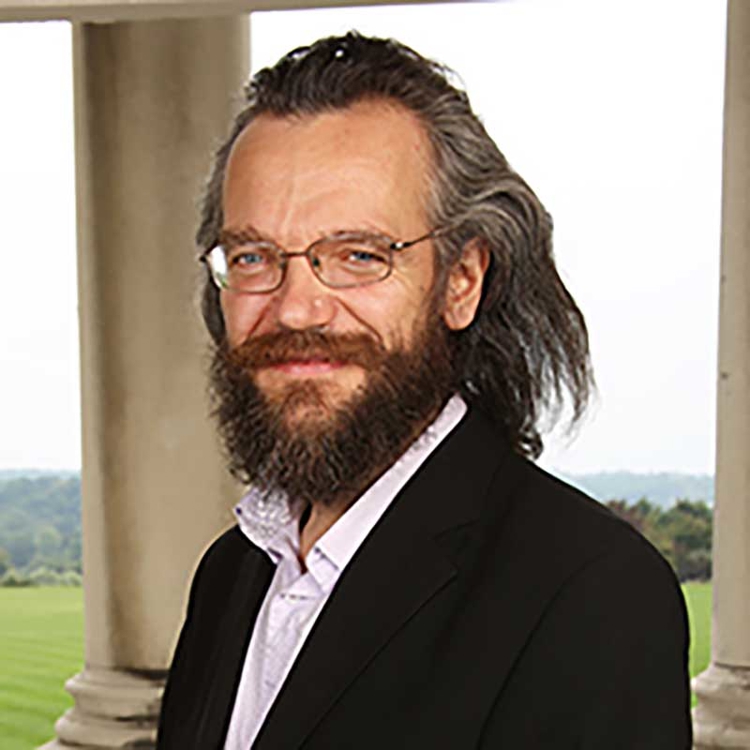
Dr Paul Dickerson
I’m Paul Dickerson, I’m a Principal Teaching Fellow and I started at Roehampton way back in 1991! Even though I have been at the University for nearly 30 years each year still feels fresh. I teach across multiple modules and programmes with a particular interest in qualitative research and social psychology and I want to enthuse everyone about this amazing subject. I love sharing my passion for psychology in all of my teaching and writing and – but don’t tell anyone – I do sometimes share a song I have written for the students that I teach. I have a particular interest in helping you to reach your full potential and I run weekly lunchtime sessions to help with this – use this link https://study.sagepub.com/psychologybrilliantessays to find out about the sorts of things covered. I hope that I will have the opportunity to help you enjoy this wonderful subject as much as I have.
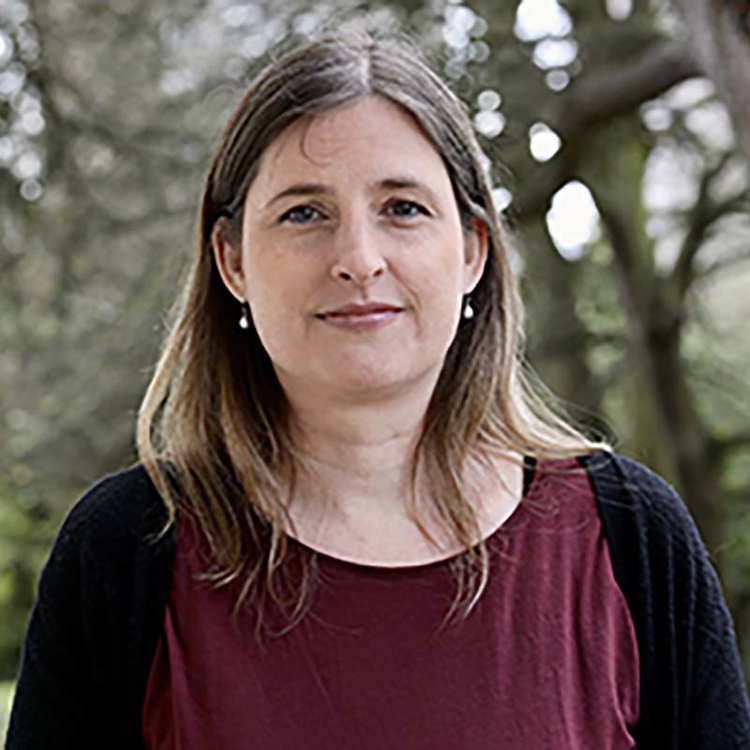
Dr Maria Gudbrandsen
Maria has a BSc in Psychology from the University of Roehampton, as well as MSc in Psychiatric Research, and a PhD in Clinical Neuroscience from the Institute of Psychiatry, Psychology and Neuroscience (KCL).
Maria is Head of Year 1 for BSc Psychology, and teach across all the BSc Psychology programmes in topics of developmental psychology, neurodevelopmental disorders, and some educational and clinical psychology. She also contributes to to the MSc Applied Cognitive Neuroscience, with a specialty in structural MRI and analysis.
Maria is also conducting her own research at the university, primarily in 22q11.2 deletions syndrome, autism and mental health.
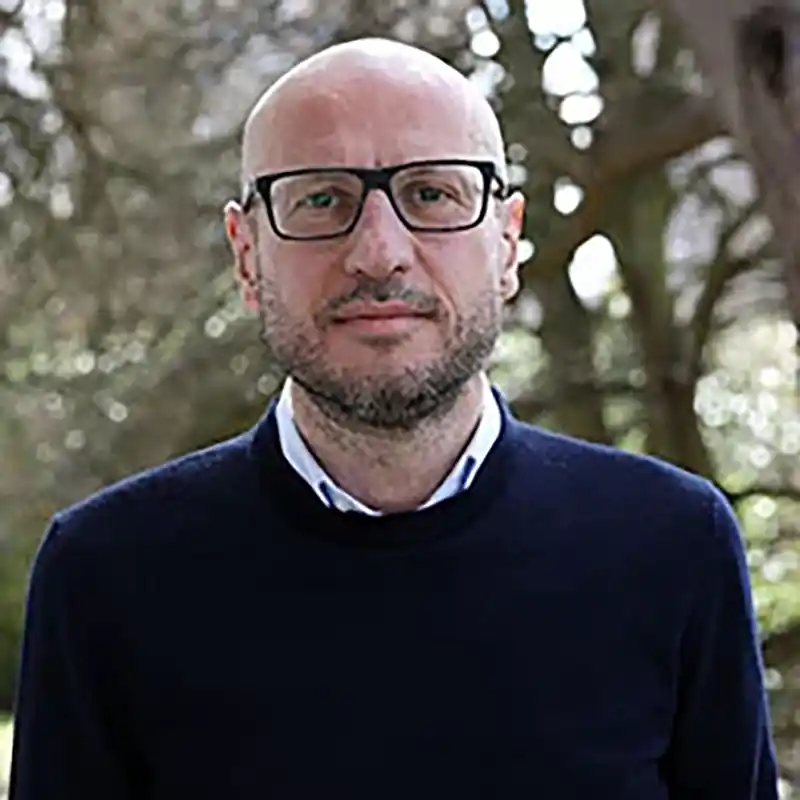
Dr Marco Sandrini
Hi, I am Marco! I have been at Roehampton since 2015. I graduated in Experimental Psychology at the University of Padua (Italy). I then obtained a PhD in Neuroscience at the University of Verona (Italy) and undertook a two-year post-doctoral fellowship at the Centre for Mind/Brain Sciences (University of Trento, Italy) and spent five-years as a research fellow at the National Institutes of Health (USA), the largest biomedical research agency in the world.
The focus of my research is interventions to enhance memory in aging and reduce the frequency of intrusive memories of trauma using the combination of neuroimaging and non-invasive brain stimulation.
I am primarily involved in the teaching of research methods and statistics and cognitive neuroscience. I am the module convenor for the second year undergraduate module “Psychological Research: Design, Analysis and Impact” and “Use of Cognitive Neuroscience Techniques” for the master in Applied Cognitive Neuroscience
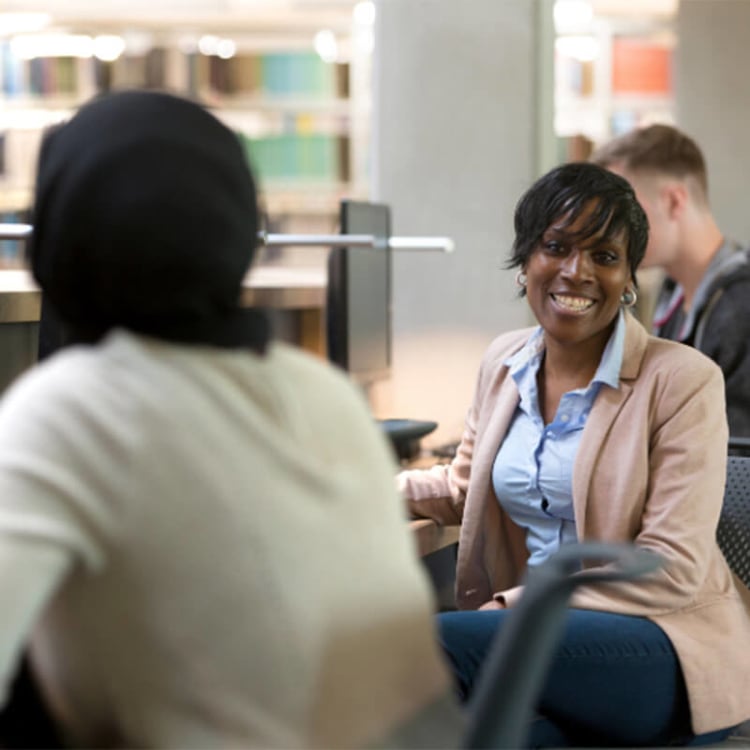
Assessment
Your assessments will reflect the professional world you will graduate into.
There are very few formal exams or essays. Instead, you’ll be working on team projects, portfolios, case studies and more. This will give you the practical experience of applying psychology to allow you to develop professional skills to excel in your career.
Between Years 2 and 3, you can also opt for a professional placement year, meaning you have the opportunity to apply for a placement and gain valuable real-world experience.
Careers
Graduate with an expert skillset for the psychology and education sectors.
You’ll be ready to apply for further training routes, including:
- Educational Psychology
- PGCE leading to Qualified Teacher Status
- Higher Level Teaching Assistant (HLTA) qualification.
You will also be ready for a career in mental health and wellbeing, research, communications and policy.
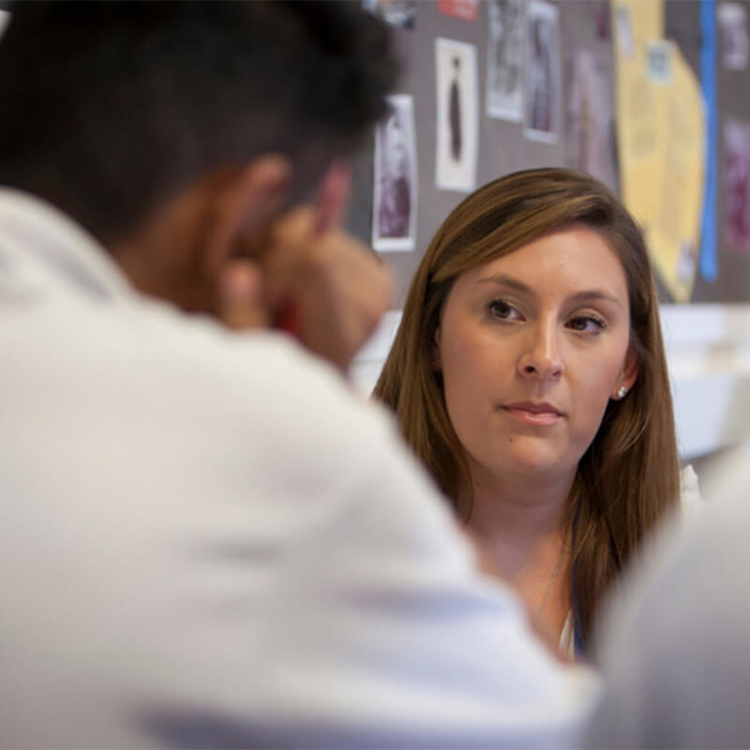
Open days
Get a real taste of our campus, community and what it’s like to study at Roehampton
Applying
Full-time UK undergraduate students apply through UCAS.
Course subject to curriculum enhancement and revalidation.
Entry tariff
2025/26 entry: Call 0300 303 8320 to find out if you are eligible for this programme in Clearing
Looking to work out your UCAS points or find out about our entry requirements? Find out more.
When we consider applications to study with us, we form a complete view of your achievements to date, and future potential, and can offer flexibility in entry requirements. Find out more about our Contextual Offer scheme.
Specific entry requirements
GCSE requirement: Maths, Grade 4/C.
General entry requirements
September 2025 entry tuition fees
UK (home) tuition fees
Undergraduate degree: £9,535
Foundation Year: £9,535
We offer a wide range of scholarships and bursaries. See our financial support pages for UK students.
We also provide other ways to support the cost of living, including free buses and on-campus car parking, hardship support and some of the most affordable student accommodation and catering in London. Find out more about how we can support you.
Additional costs to consider
Work experience may require students to have an enhanced DBS check. Depending on the location of the work placement, additional travel costs may be incurred.
International undergraduate students apply through our direct application system.
Course subject to curriculum enhancement and revalidation.
Entry tariff
2025/26 entry: Call 0300 303 8320 to find out if you are eligible for this programme in Clearing
Looking to work out your UCAS points or find out about our entry requirements? Find out more.
When we consider applications to study with us, we form a complete view of your achievements to date, and future potential, and can offer flexibility in entry requirements. Find out more about our Contextual Offer scheme.
Specific entry requirements
GCSE requirement: Maths, Grade 4/C (or equivalent).
General entry requirements
September 2025 entry tuition fees
EU and international tuition fees
Undergraduate degree: £16,950
Foundation Year: £16,950
International Foundation Pathway: £16,950
We offer a wide range of scholarships and bursaries. See our financial support pages for international students.
We also provide other ways to support the cost of living, including free buses and on-campus car parking, hardship support and some of the most affordable student accommodation and catering in London. Find out more about how we can support you.
Additional costs to consider
Work experience may require students to have an enhanced DBS check. Depending on the location of the work placement, additional travel costs may be incurred.



